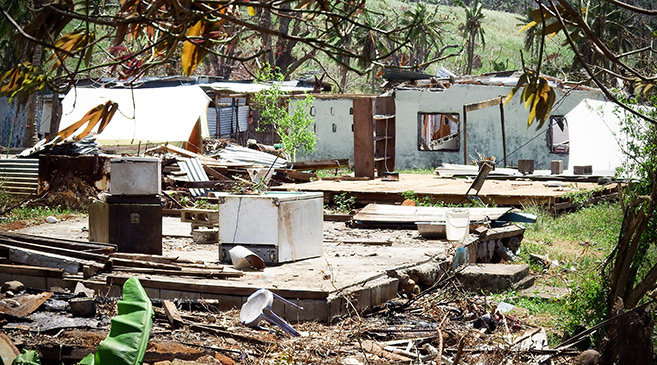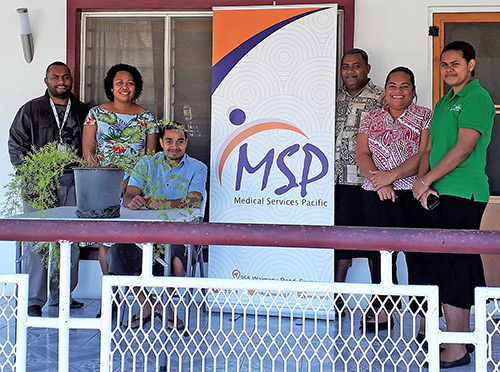Putting the “Grand Bargain” into Action in the Pacific
Date:
Author: Terri-Ann Oquinn
Suva, Fiji — On 19 August, World Humanitarian Day, UN Women joins other humanitarian actors in recognising the essential work of humanitarians in conflict zones and disasters. For UN Women Fiji Multi-Country Office, working in the Pacific region means preparing for and responding to increasingly severe tropical cyclones – as seen with devastating Tropical Cyclone (TC) Winston that hit Fiji in February 2016, affecting nearly 40 per cent of Fiji’s population. Despite a strong civil society and humanitarian system led by the Government of Fiji, many local groups struggled to access funds in the critical early days of the disaster response. An innovative global agreement called the Grand Bargain, created a few months after TC Winston, is looking to change this.

In May 2016, Turkey hosted a first-of-its-kind World Humanitarian Summit (WHS) focussed on the challenges of humanitarian aid becoming more efficient, coordinated and cohesive. A key result of the summit was the “Grand Bargain” – an agreement signed by 15 of the biggest donors and 15 of the biggest aid providers globally to reduce the humanitarian funding gap and improve funding processes.
Importantly for UN Women, there was also agreement on the need to support the work of local women and women’s organizations by placing them as leaders and agents of change in humanitarian work. The UN Secretary-General confirmed in the World Humanitarian Summit that gender equality; women’s and girls’ human rights; and their empowerment in the humanitarian sphere is a universal responsibility.

UN Women is proud to be a signatory to the Grand Bargain and is working to support the WHS commitments to women and girls. UN Women Fiji Multi-Country Office, which covers 14 Pacific Island countries and territories, is working with national organizations to ensure women can participate in, lead and have equal access to humanitarian assistance. As women and girls are often excluded from disaster planning and response activities, their specific needs are not heard or included. This can affect their ability, and that of their community, to recover from a disaster.
UN Women’s Fiji MCO Representative, Aleta Miller, explained that, “natural disasters affect women and girls differently from men and boys, and in contexts of high gender inequalities such as the Pacific, they can make women and girls more vulnerable. UN Women in the Pacific builds the capacity of local partners and supports humanitarian assistance that promotes gender equality and the empowerment of women”.
UN Women is taking its WHS commitments seriously in ensuring funding reaches local actors, building their skills to implement the funding and positioning women as agents of change - not as vulnerable victims.
Following TC Winston, UN Women has been providing funds and technical support to local organizations as they work to protect women and girls from gender-based violence, help them access essential information about relief and protection services, and rebuild the marketplaces that provided women and their families with a secure food supply.
UN Women is also providing leadership to the regional Pacific Humanitarian Protection Cluster, bringing together UN agencies, regional organizations and NGOs to coordinate protection preparedness and response across the Pacific. This is a first for UN Women globally and an opportunity to ensure that women - as well as children, people with disabilities, Sexual and Gender Minorities communities and displaced people - are equal participants in planning and responding to natural disasters.
Additionally, through its Gender and Protection in Humanitarian Action programme, UN Women is strengthening the capacity of humanitarian actors in the Pacific to integrate gender and protection in their work. This includes leading the mainstreaming of gender and protection through the entire humanitarian system at the national level in countries across the Pacific region.
Reflecting on the Grand Bargain this World Humanitarian Day, UN Women is now supporting four local organizations in the region through funding received from the Global Acceleration Instrument (GAI) on Women, Peace and Security and Humanitarian Action. The GAI is a rapid finance mechanism and partnership between the United Nations, Member States, and civil society stakeholders.
Medical Services Pacific (MSP), one the organisations UN Women is supporting through GAI funding, is expanding health and social services to Labasa in the Northern Division of Vanua Levu, Fiji. Founder and Executive Director of MSP, Jennifer Poole, said, “now we can provide rapid humanitarian assistance in the Northern Division from day one of a disaster [as a result of UN Women and Global Acceleration Instrument (GAI) support]”.
The new MSP center in Vanua Levu will provide holistic health and social services, including comprehensive services for survivors of violence,” Poole added.
Poole said that by working with MSP, UN Women is supporting a local, sustainable approach to humanitarian action: “We hire local people and strengthen existing services – this will remain in place and be able to serve the needs of the community as well as respond effectively to future natural disasters.”
In the Pacific, natural disasters are becoming increasingly unpredictable and extreme, with devastating effects. Women are often the first responders to a crisis, and play a central role in the survival and resilience of families and communities. UN Women is committed to protecting the rights of disaster-affected people in the Pacific to access humanitarian assistance that promotes safety, dignity, gender equality and women’s empowerment. Finance reform through commitments like the Grand Bargain is essential to ensuring UN Women can support local organisations as the key actors in this vital work, and it’s a commitment UN Women is taking seriously.
Media Contacts:
Terri O’Quinn
Humanitarian Communications Officer, UN Women MCO Fiji,
Ph: +679 330 1178 ext. 108
Email: [ Click to reveal ]
Jacqui Berrell
Communications and Media Specialist, UN Women MCO Fiji,
Ph: +679 330 1178 ext. 125
Email: [ Click to reveal ]
Matthew Rullo
Communications Consultant, Global Acceleration Instrument (GAI) New York,
Ph: +210 255 0175
Email: [ Click to reveal ]